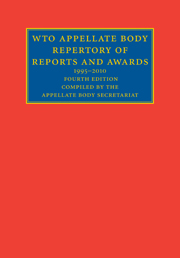Book contents
- Frontmatter
- Contents (outline)
- Contents (detail)
- Foreword to the 1995–2010 edition
- Part I Appellate Body Reports
- A
- B
- C
- D
- E
- F
- G
- H
- I
- J
- L
- M
- N
- O
- P
- R
- S
- T
- V
- W
- Part II Arbitration Awards under Article 21.3(c) of the DSU
- Annex A Terms of Office of Current and Former Appellate Body Members and Chairpersons – 31 December 2009
- Annex B Biographies of Current and Former Appellate Body Members
- Annex C Information on Appellate Body Reports – 1996 to January 2010
- Annex D Arbitration Awards under Article 21.3(c) of the DSU – 1996 to 2009
- Annex E Articles of Covered Agreements Addressed in Appellate Body Reports
- Annex F Working Procedures for Appellate Review WT/AB/WP/61
- Abbreviations used in the Table of References to the Covered Agreements and other Instruments and in the Indexes
- Table of References to the Covered Agreements and other Instruments by Article
- Index
- Subject Index by Case (Appellate Body reports)
- Subject Index by Case (Arbitration Awards under Article 21.3(c) of the DSU)
O
from Part I - Appellate Body Reports
Published online by Cambridge University Press: 05 June 2012
- Frontmatter
- Contents (outline)
- Contents (detail)
- Foreword to the 1995–2010 edition
- Part I Appellate Body Reports
- A
- B
- C
- D
- E
- F
- G
- H
- I
- J
- L
- M
- N
- O
- P
- R
- S
- T
- V
- W
- Part II Arbitration Awards under Article 21.3(c) of the DSU
- Annex A Terms of Office of Current and Former Appellate Body Members and Chairpersons – 31 December 2009
- Annex B Biographies of Current and Former Appellate Body Members
- Annex C Information on Appellate Body Reports – 1996 to January 2010
- Annex D Arbitration Awards under Article 21.3(c) of the DSU – 1996 to 2009
- Annex E Articles of Covered Agreements Addressed in Appellate Body Reports
- Annex F Working Procedures for Appellate Review WT/AB/WP/61
- Abbreviations used in the Table of References to the Covered Agreements and other Instruments and in the Indexes
- Table of References to the Covered Agreements and other Instruments by Article
- Index
- Subject Index by Case (Appellate Body reports)
- Subject Index by Case (Arbitration Awards under Article 21.3(c) of the DSU)
Summary
Objections
See also Terms of Reference of Panels (T.6)
(WT/DS26/AB/R, WT/DS48/AB/R)
…It is evident to us that a procedural objection raised by a party to a dispute should be sufficiently specific to enable the panel to address it.
US - FSC, para. 165
(WT/DS108/AB/R)
As we have said, a year passed between submission of the request for consultations by the European Communities and the first mention of this objection by the United States – despite the fact that the United States had numerous opportunities during that time to raise its objection. It seems to us that, by engaging in consultations on three separate occasions, and not even raising its objections in the two DSB meetings at which the request for establishment of a panel was on the agenda, the United States acted as if it had accepted the establishment of the Panel in this dispute, as well as the consultations preceding such establishment. In these circumstances, the United States cannot now, in our view, assert that the European Communities’ claims under Article 3 of the SCM Agreement should have been dismissed and that the Panel’s findings on these issues should be reversed. Accordingly, we decline the United States’ appeal from the Panel’s refusal to dismiss the European Communities’ claim under Article 3 of the SCM Agreement due to the European Communities’ alleged failure to comply with Article 4.2 of that Agreement. Thus, we do not find it necessary to rule on whether the European Communities’ request for consultations includes a “statement of available evidence” that satisfies the requirements of Article 4.2 of the SCM Agreement.
- Type
- Chapter
- Information
- WTO Appellate Body Repertory of Reports and Awards1995–2010, pp. 554 - 563Publisher: Cambridge University PressPrint publication year: 2011



